- Home
- Lou Cameron
Stringer and the Deadly Flood Page 9
Stringer and the Deadly Flood Read online
Page 9
“How about it, Gus,” Stringer taunted. “You want to have it out again? You sort of let me down the last time.”
Gus sat back down, muttering about damned fools. Burke smiled as if pleased. “As a matter of fact, MacEwen, we’re missing a couple of security men. I don’t suppose you met up with an Anglo called Wordsworth and a Pima called Chino in your travels?”
Stringer made a sincere effort to look as if he was really thinking hard about that before he shrugged and replied, “I just can’t say I have. You sent ’em to El Centro?”
“After you, as a matter of fact.” Burke smiled again. “They should have been back by now.”
Stringer insisted, in all honesty, that he’d met no such gents in town.
Gus growled, “They were after you, that gal, and them same papers Lockwood rode off with. How do we know they didn’t catch up with you, and lose?”
Stringer snorted in disgust. “Oh, sure. After I shot it out with two men, to prevent you ever seeing those papers again, I just naturally felt it my duty to bring the papers to the boss man here. You must read a lot of mystery stories, Gus. Why don’t you explain my mysterious motives to me? You must be stupid if you think anyone would shoot it out with two company dicks and then ride in to ask the same company for a job.”
Burke chuckled at the picture, but asked Stringer shrewdly, “What did possess you to bring me those papers after you refused to let Gus, here, have them?”
Stringer tried to keep his voice light as he shrugged and answered Burke. “I didn’t know what he wanted. After I’d crawfished your pet ape away and, like I said, sweet-talked the little lady instead of trying to scare her, Lockwood’s Mexican gal-friend showed me them. She didn’t know why they were important to you, anymore than I did. I just helped myself when we parted friendly.”
Burke said, “I see. What did you make out of them? Surely you must have looked them over before you decided to be so generous.”
Stringer nodded. “I saw right off they were charts with spiderwebs penciled on ’em. If they’d looked like treasure maps, I’d have hung on to ’em. If they’d looked like evidence of anything sneaky, they’d have cost you more just now. I don’t mind saying I’m still curious about what all the fuss is about. How come a mess of survey maps you could likely pick up cheap enough were all that valuable to you?”
Burke’s face was innocence itself as he answered Stringer, “They were company property. Lockwood had no right to keep them when I had to fire him for drinking on the job. Some of these so-called spider lines show work we’ve done or mean to do. Without them we’d have had to run more survey work, and that’s expensive.” He rolled up the maps, indicating that was the end of any more explanation. “Now, we pay our security men five dollars a day. Gus, here, will see to your company badge and register you with Arizona Territory as a licensed private detective. You’ll be working under him.”
Gus started to object again, but Burke shot him a warning look. “If you don’t like it, shoot it out with him. I just said good help is hard to find. If you’re afraid to fight him, he may be just the sort of help I’m looking for.”
When Gus didn’t answer, the camp boss turned back to Stringer and asked more mildly, “How about it, MacEwen? Are you willing to take orders from Gus if he’s willing to let by-gones be by-gones?”
Stringer said, “Sure. I never fight anyone who doesn’t want to fight with me, ah, boss. Is it too much to ask who else I might have to fight around here? Five dollars a day sounds like you’re expecting serious fighting.”
Burke said flatly, “We pay top wages for top guns. You’ll find out who you may or may not be fighting when the time comes.”
So that was how the outfit that had tried to have Stringer killed, more than once, wound up putting him on its payroll.
CHAPTER EIGHT
Gus sullenly led Stringer to the nearby paymaster’s tent and left him in the care of fussy little coot who asked so many fool questions that Stringer feared they suspected him until he decided the priss was likely just in love with his own overly neat penmanship. Stringer was hard put to come up with details he’d be able to recall as to his last dozen mailing addresses and previous employers. He’d chosen Donald MacEwen as a handy alias because he’d talked to some friendly member of the Frisco P.D. about the common mistakes folk made when picking a new name. The disadvantages of “Smith” and “Jones” were obvious. The all-time smartest alias was a hard-to-spell ethnic name from a different background than one’s own, since few expected an Irishman to come up with a German name, a German to use an Armenian name, and so forth. But Stringer had taken the less complicated route of adopting the first name of a favorite uncle, and MacEwen of course meant “Son of Ewen” which he was. The same helpful detective had explained that the more foolproof total switch could lead to foolish slips before a new name settled in. Stringer knew that should someone call out his uncle’s or his father’s name unexpected he’d be likely to turn and respond in a normal fashion instead of just walking on as if he didn’t know his own fool name. Besides, most folks thought any name with a Mac was Irish, and there were more Irish cowhands and railroad workers than one had time to brood about.
The paymaster rummaged about in a drawer in vain for a spare badge and said he’d have to get one for Stringer from Yuma, along with some proper I.D. “Anyway,” he added with a sniff, “nobody will challenge your authority in camp. Most of our workers are illiterate Mexicans. Just don’t get into fights off the reservation until we can get you fixed up with proper I.D. I need your John Hancock on this card for the paybook. Next payday will be a week and a half away.”
Stringer signed Donald MacEwen in as natural a manner as he could manage and that seemed to be that. Just then a lean and hungry-looking individual dressed in jeans, black shirt, charcoal Stetson and two Colt .45s in a buscadero tie-down rig ducked into the tent. He greeted Stringer curtly. “Gus told me to show you about and help you get settled in. I’d be Sean Donovan, better known as Cactus Jack.”
Stringer shook the hand the killer held out to him. He’d expected Cactus Jack to look more like the burly bully Gus. The almost civilized Cactus Jack shook firmly but without the unspoken challenge of the usual bully. His expression was neither warm nor nasty. Stringer sensed the notorious gunslick was simply a cold fish, so sure of himself that he didn’t care whether anyone liked him or feared him. He just did what they’d told him to do. He’d have no doubt come in now with both guns blazing and with no more emotion if that had been what the boss ordered.
As they stepped outside together, Stringer said the mule he’d ridden in had to come before anything else. So they strode over to the saloon tent. Stringer was braced for the usual cowhand comments on mules, but Cactus Jack said nothing as he waited for Stringer to untether his mount. Then he led them both to the roped-in remuda and ordered their young Mexican wrangler to see to the critter and put Stringer’s saddle and gear in the tack tent on the far side. When Stringer made as if to help, Cactus Jack stopped him impatiently. “Don’t. The greaser’s paid to wrangle. You and me are paid to keep order in camp. Come on, I’ll show you around. There’s not much about this job you’ll find complexicated. Us and our guns just have to be handy when the damnfool ditchdiggers act up. Most of ’em are Border Mex. They don’t get out of line often, but when they do we got to move in fast and bust as few heads as it takes to stop the fight. The boss can’t get much work outten a Mex we bust up really hard, see?”
Stringer agreed it made sense to nip fights in the bud and, as they strolled along the service road between the railroad tracks and canal, he began to revise his first impression of total chaos.
The canal ran more or less in line with the tracks, two hundred feet, or “an easy tote” as Donovan put it, south of the rail line. The tent city naturally lay between, the tents staked a mite haphazardly for at least a quarter mile east and west. Most of the tents seemed to be army surplus, left over from the recent war with Spain. Cactus Jack explained that as work prog
ressed toward the west the tents were repitched, sort of leap frog, since the one farthest east was always the one farthest from the work face. It was up to whoever used a tent as business or living quarters to decided when it was time to pull up the stakes. Some workers were willing to walk farther to work in the morning than others. Few of the tents were ever completely empty. Whenever they could, Mexican laborers preferred to have their dependents with them.
As some bare-assed little kids ran past them, Cactus Jack explained indulgently that it made sense to let the greasers drag their mujeres along. “I had to police an all-stag and mostly Irish railroad construction camp one time,” he explained. “When men can’t screw, they drink and fight instead. This way’s better, even if it does complexicate the supply problem. After a hard day’s work in the sun our greasers just naturally roll over and go to sleep after tearing off a piece. The only thing wrong with having their mujeres along is that sometimes they fight over the same one, and when men fight over women they fight a lot meaner than your average drunk Irishman. You got to drop the one with the knife fast lest he cripple or kill half a dozen good shovel hands afore they can get outten his way.”
Stringer asked what the standing orders were if a couple of workers were going at it with knives. Cactus Jack said coolly, “You drop ’em both, of course. The trouble with an overexcited Mex with a knife is that he seldom knows when to stop. We had to gun one of their women a week or so ago. She was a sassy little thing with round heels and a welcome mat betwixt her thighs. She caused a dozen serious fights afore we figured out that she was causing ’em. Greasers are too romantic natured to just take advantage of such free and easy gals. Each and every one of ’em seems to think a gal he laid the first night has to be his one true love forever.”
Stringer frowned thoughtfully as they walked on and asked, more casually than he really felt, “How come you had to kill her? Couldn’t you have just run her out of camp?”
Cactus Jack shrugged. “It was Gus as gunned her. He’d told her he would if she come back. We did run her out, more’n once. But she wouldn’t stay run. So there was nothing else Gus could do. You can’t let greasers defy you, you know.”
Stringer repressed a shudder, asking how the other Hispanics had taken such harsh treatment of the woman. Cactus Jack said, “Oh, all the mujeres and some of them men were glad to see the last of her. It’s hard as hell to get any sleep with damned fools fighting over pussy next door.”
They came to where an irrigation ditch cut across their path to duck under the railroad tracks and run on to the north. It wasn’t the one Stringer had followed out of the desert. He’d had to swing wide of that one when he’d seen the steam shovel off to his right. He didn’t think much of the way this one slipped under the Southern Pacific’s right of way. The twin tracks ran east and west along an embankment no higher than the shoulders of a man afoot. They’d just dumped crushed rock ahead as they’d crossed the soft, flat silt. The new culvert that the water now ran through was a jerry-rigged underpass constructed of railroad ties and a few bigger timbers to bear the weight of the trains rolling over it. Stringer knew wood didn’t rot worth mention in the desert, but only because it rarely got wet.
“They ought to have a floodgate here. If those bottom ties stay wet all the time…” he started to point out.
“That’s Blacky’s business.” Cactus Jack impatiently cut in.
So Stringer just shrugged and said, “You’re right. It’s not on my plate if a train crunches down through rotten underpinnings. It’s not that big a drop in any case.”
Cactus Jack agreed. “Right. We ain’t working for the railroad. Our outfit is just out to ditch this fool desert, with a bonus for every extra mile ahead of the timetable set by Yuma. There’s nothing in them tents across the way but mujeres and a yaller dog that snaps. You ready for a beer now?”
Stringer agreed that sounded like a grand notion. As they turned to saunter back the other way, Cactus Jack pursed his lips thoughtfully. “Gus says you was in El Centro a spell back. You heard about my visit no doubt?”
Stringer nodded soberly and replied, “I did. The few I talked to about it seemed to hold the view it was a fair fight, Jack.”
The killer shrugged. “Fair or not, that damned fool had no call to cause Blacky so much trouble, MacEwen.” Then he got even more casual as he said, “Speaking of Macs. Do you recall another Mac called MacKail in connection with El Centro?”
Stringer made an effort to look unconcerned as he replied, truthfully enough, “I can’t say anyone called MacKail was the topic of conversation when I was passing through. Are we supposed to be after him?”
Cactus Jack grimaced. “Likely not, now that Lockwood can’t meet up with the pest. MacKail’s a newspaperman with a rep for poking his nose into other gent’s business. Lockwood bragged in town that he’d sent for MacKail and that once the story was in the newspapers Blacky Burke and some others would be in a heap of trouble.”
Stringer tried to sound less interested than he was as he responded, “Do tell? I wonder what the rascal had in mind. I had a look at those company charts he rode off with before I brought ’em back to Blacky. All I could make out was that they said our outfit was digging over here. I don’t see how that could get anyone in trouble. Hell, everyone riding back and forth across this desert must have noticed that swamping steam shovel and all this ditch water by now. What sort of secret do you reckon Lockwood aimed to spill to that nosy MacPhail?”
“The name’s MacKail, not MacPhail,” Cactus Jack corrected. “As to deep, dark secrets about construction out in open sight of cross-country travelers, your guess is as good as mine. Anyways, I’ve always been better with a gun than with a shovel.”
There was more shoveling going on along the excavation to their left as they approached the salon tent. As far as Stringer could make it out, the steam shovel farther west was simply gouging out big gobs of dirt. Behind it, workers with shovels, hoes, and rakes had the task of smoothing the banks to a uniform width and more gentle angle. The silt’s angle of repose seemed about thirty degrees. Had he been in charge he’d have considered waterproofing the bare mudbanks with cement or at least road tar. It still looked like rain, and while rain was rare out here it tended to make up for it when it arrived. He didn’t ask Cactus Jack if those banks wouldn’t erode like hell in a good gully-washer. He doubted even Black Burke wanted to think about that if he was getting paid by the mile instead of the future.
But that couldn’t be what Lockwood had wanted to tell him. Gut-and-git was a code of the west more often followed than any code the writers of penny dreadfuls had ever come up with. Stringer had tried to sell many a feature on the Rape of the West. Every time he had, Sam Barca had pointed out that their readers didn’t give a hoot about natural resources they couldn’t get at. The land-loving Amish and landscape painters of the Hudson Valley hadn’t been the folk who’d won the west. Few folk had trekked thousands of miles and fought at least that many Indians to admire the scenery and preserve the balance of nature. As Sam Barca liked to remark about the anguished John Muir and other worried naturalists, “A gent could study a butterfly just as well back east. Our readers come out here to get rich.”
So there was no fresh news or a scandal worth reporting if all the water lords were up to out here was messing up a desert. Such doings were called progress and almost everyone out west approved. Nobody cared if range was overgrazed or how many trout streams got choked with mine waste as long as the men who got rich at the game paid their bills on time. The home range Stringer had grown up on was a lot more eroded than when the Miwok had gathered acorns on now open slopes of cheat grass and black mustard. The oyster beds of Frisco Bay that Jack London recalled so fondly were now fetid mudflats that stank of Frisco sewage when the tide was out. And nobody cared. So what in thunder could Blacky Burke be up to here that anyone might care about?
CHAPTER NINE
The outfit had no time clocks. When it got light enough to see, the mo
stly Mexican crew was supposed to get to work. When it got too dark to see, they were allowed to knock off for the day. Most staggered home to eat the tortillas and beans prepared by their mujeres. A mess tent was set up to feed the Americanos who ran things, along with a few single Mexicans, who of course had their own table and had the expense of gringo rations deducted from their day wages.
Stringer got to eat free, which he thought just as well after he had tasted the cow camp grub they served. As an overlord who wasn’t supposed to consort with mere Mexicans unless they were pretty and he wanted to, Stringer had been issued his own tent, and the laborers who’d been ordered to set it up for him seemed surprised but not displeased when he pitched in to help them. He’d have wanted to, even if he hadn’t been so good-natured, because he saw right off that the kid driving the stakes was more used to living in an adobe.
Stringer tried not to hurt the young Mexican’s feelings when he reset the stakes to hold in case the overcast sky had any wind in mind. It was now too dark, and too hopeless a task in any case, to concern himself with how many of the other tents along the canal were staked securely. If they blew down they blew down. He didn’t think his would, now.
A couple more peones brought an army cot and the saddle and possibles he’d been worried about to the tent. He said he’d set up the cot and dismissed them with handshakes all around which they seemed to find surprising as well. Once he had his oil lantern going, Stringer went through his old gladstone. He’d seen right off that someone had forced the lock. But as he laid out his belongings on the dirt floor, he felt sure that thieving Mex kids hadn’t gone through his personal things. Although nothing was missing, he was certainly glad he hadn’t held out on Lockwood’s papers or, God forbid, hung on to Lockwood’s barometer.
He’d known before leaving Juanita’s cart that everything south of that fossil beach had to be above mean sea level, and the few pencil lines Lockwood had added to the survey charts had been easy enough to memorize, for all they really told him. His press pass and other identification were on him, no longer in a wallet anyone might want to look at but tucked into the lining of his right boot. One of the nice things about Justins was that the thin, smooth inner lining was separate from the outside leather and one only had to pick out a few stitches with a pocket knife to have a handy hiding place.

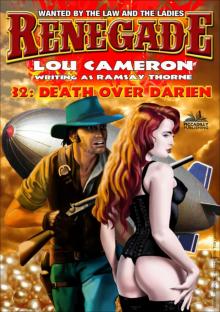 Renegade 32
Renegade 32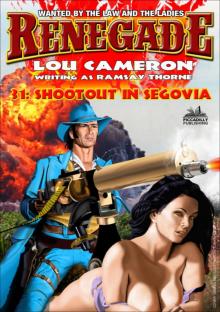 Renegade 31
Renegade 31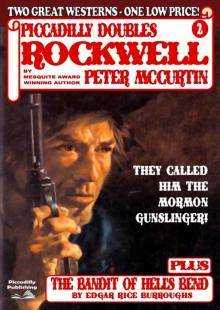 Piccadilly Doubles 2
Piccadilly Doubles 2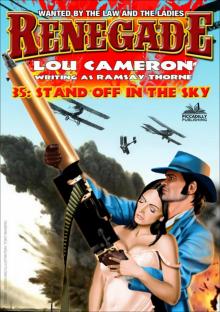 Renegade 35
Renegade 35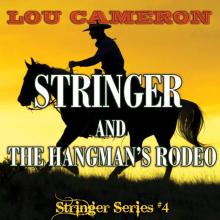 Stringer and the Hangman's Rodeo
Stringer and the Hangman's Rodeo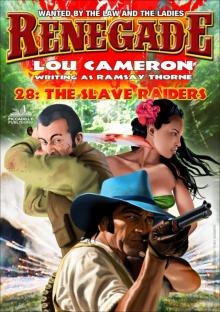 Renegade 28
Renegade 28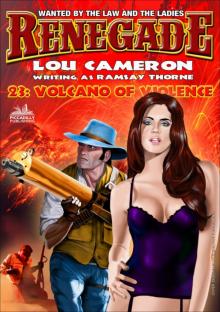 Renegade 23
Renegade 23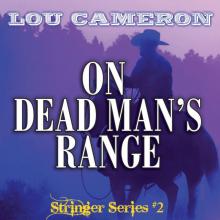 On Dead Man's Range
On Dead Man's Range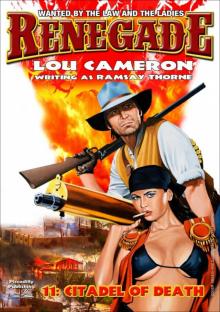 Citadel of Death (A Captain Gringo Western Book 11)
Citadel of Death (A Captain Gringo Western Book 11)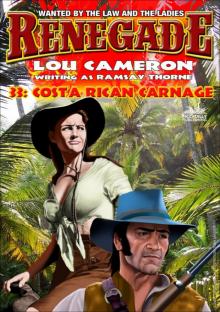 Renegade 33
Renegade 33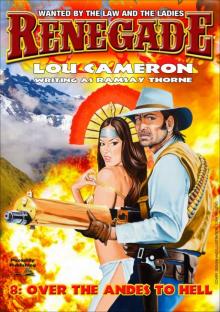 Over the Andes to Hell (A Captain Gringo Western Book 8)
Over the Andes to Hell (A Captain Gringo Western Book 8)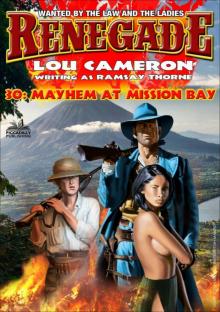 Renegade 30
Renegade 30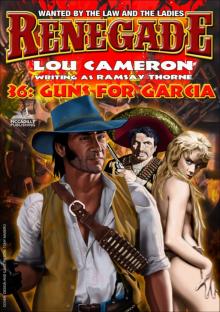 Renegade 36
Renegade 36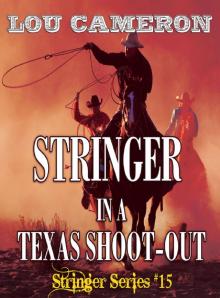 Stringer in a Texas Shoot-Out
Stringer in a Texas Shoot-Out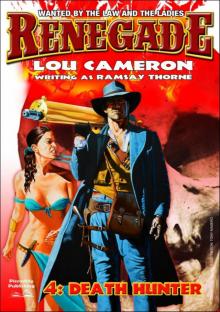 The Death Hunter
The Death Hunter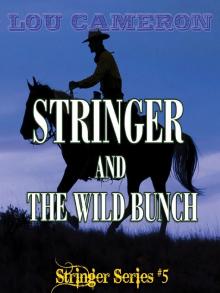 Stringer and the Wild Bunch
Stringer and the Wild Bunch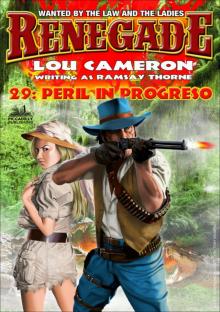 Renegade 29
Renegade 29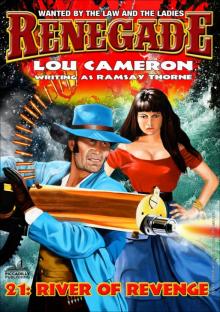 Renegade 21
Renegade 21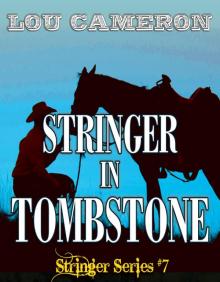 Stringer in Tombstone
Stringer in Tombstone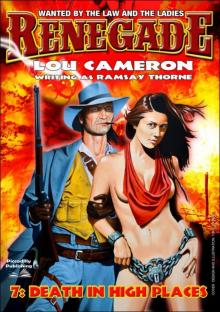 Death in High Places (A Renegade Western Book 7)
Death in High Places (A Renegade Western Book 7)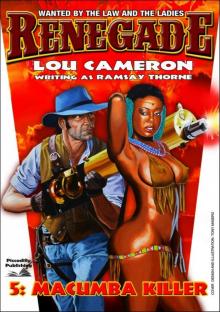 Macumba Killer
Macumba Killer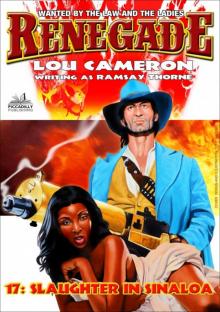 Renegade 17
Renegade 17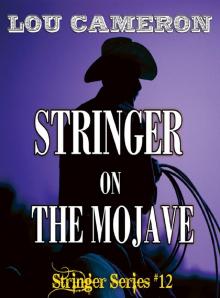 Stringer on the Mojave
Stringer on the Mojave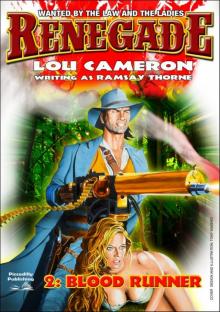 Blood Runner
Blood Runner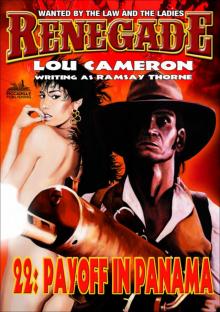 Renegade 22
Renegade 22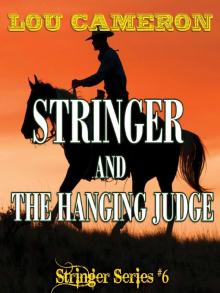 Stringer and the Hanging Judge
Stringer and the Hanging Judge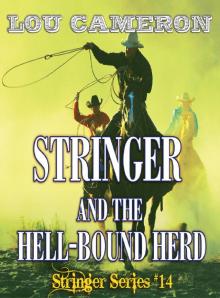 Stringer and the Hell-Bound Herd
Stringer and the Hell-Bound Herd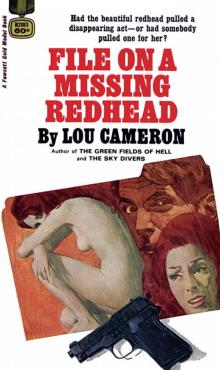 File on a Missing Redhead
File on a Missing Redhead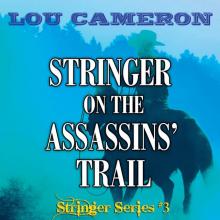 Stringer on the Assassins' Trail
Stringer on the Assassins' Trail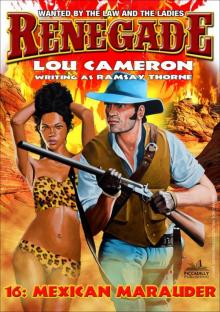 Mexican Marauder (A Captain Gringo Adventure #16)
Mexican Marauder (A Captain Gringo Adventure #16)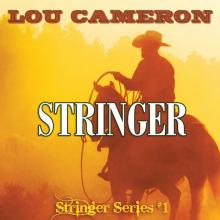 Stringer
Stringer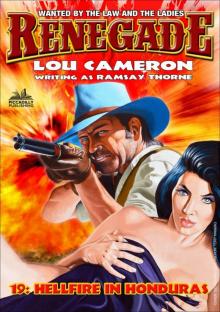 Renegade 19
Renegade 19 Stringer and the Oil Well Indians
Stringer and the Oil Well Indians Stringer and the Lost Tribe
Stringer and the Lost Tribe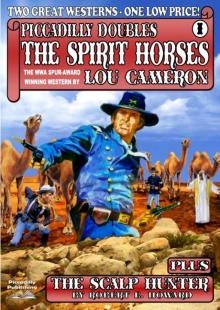 Piccadilly Doubles 1
Piccadilly Doubles 1 Stringer and the Border War
Stringer and the Border War Renegade
Renegade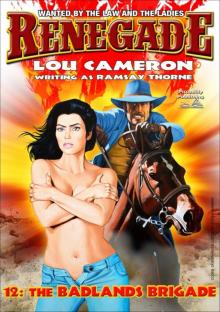 The Badlands Brigade (A Captain Gringo Adventure Book 12)
The Badlands Brigade (A Captain Gringo Adventure Book 12)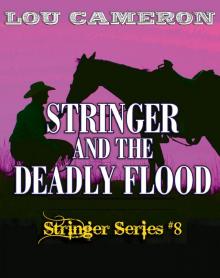 Stringer and the Deadly Flood
Stringer and the Deadly Flood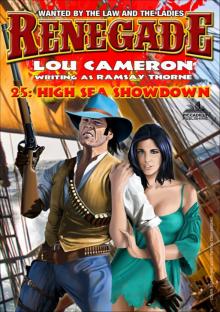 Renegade 25
Renegade 25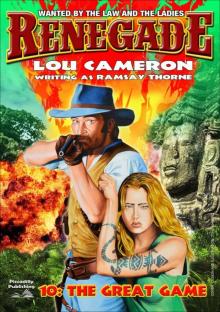 The Great Game (A Captain Gringo Western Book 10)
The Great Game (A Captain Gringo Western Book 10)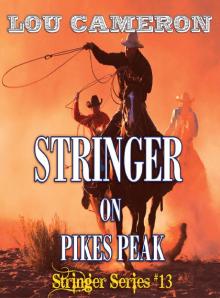 Stringer on Pikes Peak
Stringer on Pikes Peak